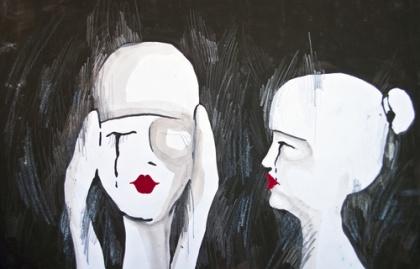I Try to Remember What Is Beautiful


Written and verified by the psychologist Raquel Aldana
We as humans tend to remember the bad more often than the good. Holding on to bad memories is a fatal trap for our feelings and emotions. Their traces entrench themselves deeper and deeper in our mind and set us off balance.
It is not that I have lost my memory. It is that I only remember what I want to remember. It is called selective memory, and it is beneficial to possess it.
Undoubtedly, our resentment, and even our longing for revenge, are based on something justifiable. However, the truth is that by harboring these feelings, we only cause ourselves more pain.
Bad memories generate a complex instability that becomes deep-set in our subconscious. This happens because when we feel deceived or hurt, there is something that breaks inside of us, and leaves us unable to react and manage it properly.
In other words, because we are unable to or are not given the option to express what we want, we end up thinking about it too much. We end up turning over the situation in our minds and forming ideas and negative feelings regarding the person who hurt us. This takes its toll, and causes us to start thinking of this person as an “enemy.“
With time, these feelings can intensify and create a wide range of problems for us, both psychological and physical. It is because we are bound to that harmful person or situation and carry it around forever on our backs.
Without a doubt, by carrying around bad memories and feelings, we deny ourselves the opportunity to be happy.
It is better to hold on to the good memories
Feeding our resentment is the same as living a bitter life and losing our true identity. In any case, as we have seen, being able to break ourselves of this habit is a slow and painful process.
For as undesirable as a given situation may be, there can be a lesson found in everything that happens to us. Something positive can always be found and extracted. This doesn’t mean that it isn’t normal to cry or feel angry when something happens, but rather the opposite. It means that it will serve as a form of freedom and liberation for us.
However, it is important to not feed those negative feelings. Disregarding the influence they have on us and giving them a place in our mind creates a vicious cycle that is difficult for us to escape.
For that reason, it may be normal to not want to say that we have to work to clean our wounds. Ideally, we would be able to make our selective memory as efficient as possible, and allow ourselves to remember, over all other things, the lessons each life experience has offered us.

How to detach ourselves from the bad and remember the good
Our emotional well-being greatly depends on how we prioritize our lives. Considering this, the best thing to do is work to channel and compartmentalize the black hole of our negative feelings.
The idea is to give a higher priority to the good, the beautiful, and the positive. In order to do this, we should elaborate on a few emotional points:
- If given the opportunity, talk to the person who caused you pain. If this is not possible, write them a letter or imagine that you are talking to them. Tell them what you think and feel. Empty yourself of those pent up feelings. Doing this has a great healing power and effect on us.
- Being hurt and deceived is inevitable. What we must accept is that these things happen as a result of partaking in any relationship, or creating expectations. For this reason, when something happens, we have to be able to express our emotions and feelings correctly, efficiently, and effectively.
- Don’t pass judgement and avoid thinking that you are better than the other person. We all make mistakes and, many times, we don’t pay proper attention when it is time to appreciate the actions of others. Keep an open mind and consider all the possibilities. Never close yourself off.
- Accept that people change. The important point does not lie in that someone may have hurt you, but rather that we all as humans are capable of change. Disassociate yourself with the image you had formed of that person and accept that they may have changed in ways of which you may not be aware.
- Let go of the negative and let things flow. This step is relatively complicated because it means accepting that life isn’t always fair. Despite the fact that learning is good, it is not always easy to extract the positive lesson from something negative that has happened to us. Once we have accepted what we have to learn, the best thing to do is to let go of the negative side of the experience.
It is essential to remember the good that we have lived with people, and equally important to remember it for those in our present as well as our past. We must know how to order and channel our feelings in each and every moment. Having this clear in our minds, we will develop the virtue of a selective memory: we can leave out the negative and only remember the positive.
We as humans tend to remember the bad more often than the good. Holding on to bad memories is a fatal trap for our feelings and emotions. Their traces entrench themselves deeper and deeper in our mind and set us off balance.
It is not that I have lost my memory. It is that I only remember what I want to remember. It is called selective memory, and it is beneficial to possess it.
Undoubtedly, our resentment, and even our longing for revenge, are based on something justifiable. However, the truth is that by harboring these feelings, we only cause ourselves more pain.
Bad memories generate a complex instability that becomes deep-set in our subconscious. This happens because when we feel deceived or hurt, there is something that breaks inside of us, and leaves us unable to react and manage it properly.
In other words, because we are unable to or are not given the option to express what we want, we end up thinking about it too much. We end up turning over the situation in our minds and forming ideas and negative feelings regarding the person who hurt us. This takes its toll, and causes us to start thinking of this person as an “enemy.“
With time, these feelings can intensify and create a wide range of problems for us, both psychological and physical. It is because we are bound to that harmful person or situation and carry it around forever on our backs.
Without a doubt, by carrying around bad memories and feelings, we deny ourselves the opportunity to be happy.
It is better to hold on to the good memories
Feeding our resentment is the same as living a bitter life and losing our true identity. In any case, as we have seen, being able to break ourselves of this habit is a slow and painful process.
For as undesirable as a given situation may be, there can be a lesson found in everything that happens to us. Something positive can always be found and extracted. This doesn’t mean that it isn’t normal to cry or feel angry when something happens, but rather the opposite. It means that it will serve as a form of freedom and liberation for us.
However, it is important to not feed those negative feelings. Disregarding the influence they have on us and giving them a place in our mind creates a vicious cycle that is difficult for us to escape.
For that reason, it may be normal to not want to say that we have to work to clean our wounds. Ideally, we would be able to make our selective memory as efficient as possible, and allow ourselves to remember, over all other things, the lessons each life experience has offered us.

How to detach ourselves from the bad and remember the good
Our emotional well-being greatly depends on how we prioritize our lives. Considering this, the best thing to do is work to channel and compartmentalize the black hole of our negative feelings.
The idea is to give a higher priority to the good, the beautiful, and the positive. In order to do this, we should elaborate on a few emotional points:
- If given the opportunity, talk to the person who caused you pain. If this is not possible, write them a letter or imagine that you are talking to them. Tell them what you think and feel. Empty yourself of those pent up feelings. Doing this has a great healing power and effect on us.
- Being hurt and deceived is inevitable. What we must accept is that these things happen as a result of partaking in any relationship, or creating expectations. For this reason, when something happens, we have to be able to express our emotions and feelings correctly, efficiently, and effectively.
- Don’t pass judgement and avoid thinking that you are better than the other person. We all make mistakes and, many times, we don’t pay proper attention when it is time to appreciate the actions of others. Keep an open mind and consider all the possibilities. Never close yourself off.
- Accept that people change. The important point does not lie in that someone may have hurt you, but rather that we all as humans are capable of change. Disassociate yourself with the image you had formed of that person and accept that they may have changed in ways of which you may not be aware.
- Let go of the negative and let things flow. This step is relatively complicated because it means accepting that life isn’t always fair. Despite the fact that learning is good, it is not always easy to extract the positive lesson from something negative that has happened to us. Once we have accepted what we have to learn, the best thing to do is to let go of the negative side of the experience.
It is essential to remember the good that we have lived with people, and equally important to remember it for those in our present as well as our past. We must know how to order and channel our feelings in each and every moment. Having this clear in our minds, we will develop the virtue of a selective memory: we can leave out the negative and only remember the positive.
This text is provided for informational purposes only and does not replace consultation with a professional. If in doubt, consult your specialist.








